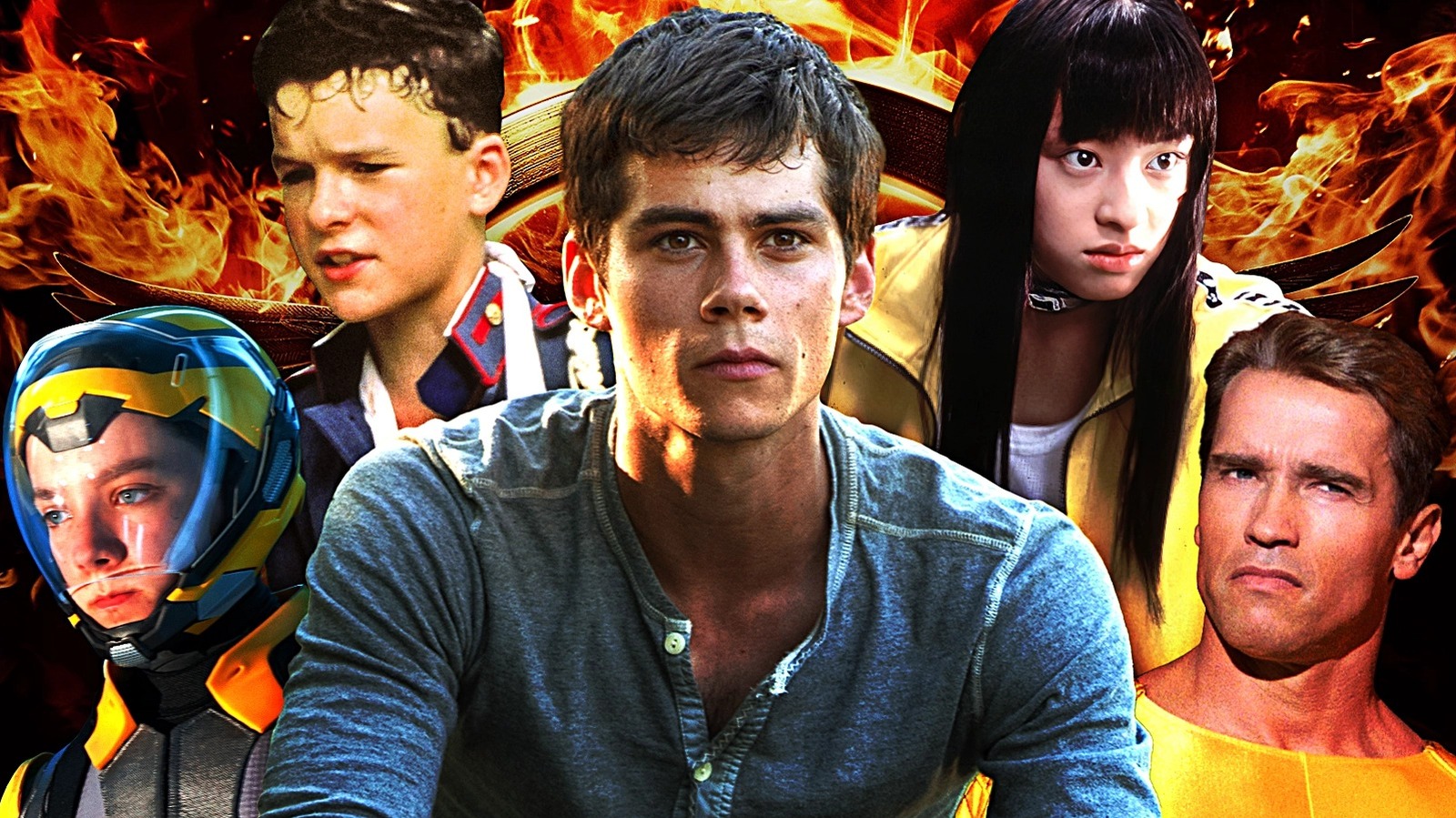
The 15 Movies That Will Appeal to Fans of the Hunger Games Series
In the stark, dystopian universe of Panem, society is sharply divided into various districts. Every year, young tributes are taken from impoverished agricultural regions to engage in a brutal combat organized by the opulent Capitol known as “The Hunger Games.” This televised gladiatorial spectacle is not only a battle for survival but also a contest of appearance and charisma, as the competitors must capture the viewing audience’s interest as much as they must eliminate each other. This concept stems from Suzanne Collins’ original Hunger Games trilogy, which quickly transitioned into a four-part movie franchise. Jennifer Lawrence’s portrayal of Katniss Everdeen shot her to stardom as she volunteered to take her sister’s place, ultimately becoming the face of a rebellion against the ruthless President Snow.
The captivating premise of young fighters in violent competitions isn’t unique to Collins; there are plenty of other films echoing this theme. If you enjoyed the tension and excitement of “The Hunger Games,” you’ll find a treasure trove of films that share similar traits—some are exact replicas, while others offer just a hint of resemblance to familiar elements. Here are 15 standout films that fans of “The Hunger Games” might appreciate.
Battle Royale
Regarded as a frequently mentioned comparison to “The Hunger Games,” “Battle Royale” is a provocative Japanese film that faced challenges with its initial U.S. release due to its extreme content. Directed by Kinji Fukasaku, this film, which came out in 2000, presents a harrowing tale of junior high school students forced by the government to kill one another on a deserted island—a narrative that resonated in the wake of the Columbine incident. With elements like explosive collars to ensure compliance among the competitors, the film dives deep into the critique of a totalitarian society. Its sequel, crafted by Fukasaku’s son after the director’s death, showcases survivors rising against oppressive systems, akin to Katniss and her allies.
The Maze Runner
In the surge of post-“Hunger Games” young adult adaptations, “The Maze Runner” stood out with its engaging premise based on James Dashner’s novels. The story revolves around teenagers who awaken in a glade, devoid of their memories, faced with a choice: establish their own community or escape the perilous maze enveloping them. The film combines a sense of urgency with the inherent threat posed by the maze’s creatures, the Grievers. However, the sequels struggled as the intrigue diminished once the maze was conquered.
Cube
Directed by Vincenzo Natali, “Cube” introduced audiences to a chilling puzzle where seven strangers find themselves trapped in a maze of deadly cubes. The film employs implications of corporate experimentation and societal neglect. As the characters navigate lethal traps, dynamics resembling reality shows, particularly “Big Brother,” emerge, captivating viewers with a sense of suspense.
The Running Man
Based on Stephen King’s story, “The Running Man” presents a dystopian game show concept starring Arnold Schwarzenegger, who finds himself wrongfully accused and forced into a deadly televised arena filled with eccentric gladiators. As he fights for survival, the film offers a visceral reflection on state control and the spectacle of violence, portraying a grim portrayal of entertainment as a means of distraction from societal issues.
31
In Rob Zombie’s interpretation of the death game genre, “31” presents a group of contestants—including carnival workers and killer clowns—forced to kill one another while an elite group of wealthy spectators bets on the grisly outcome. Deviating from the expected formula, the film ends with each participant continuing their violent pursuit, leaving a haunting impression of social dynamics.
Logan’s Run
A cult classic of the 1970s, “Logan’s Run” imagines a future society that eliminates anyone over 30 as part of a misguided attempt to preserve resources. The film critiques the obsession with youth, presenting Logan 5, tasked with eliminating escapees from a system that promises renewal but ultimately leads to fatal consequences. Despite its dated special effects, the cautionary tale remains relevant in contemporary discussions around aging and societal value.
Starship Troopers
Released in 1997, “Starship Troopers” initially puzzled audiences with its satirical approach to war and propaganda. Presenting a future where society glorifies conflict with giant alien bugs, the film serves as a reflection on militarism and the dangers of blind patriotism. Over time, it has garnered appreciation for its critical stance on fanfare associated with violence.
Ender’s Game
Displaying a more earnest tone, “Ender’s Game” follows young recruits in battle against a hostile alien species. Ender Wiggin inadvertently participates in a genocide without comprehending the consequences of his actions. The film serves as a commentary on the innocence of youth, the implications of militarization, and the broader themes of misunderstanding in conflicts.
Zathura: A Space Adventure
This “Jumanji” spin-off stars a young Josh Hutcherson and delves into a magical board game that transforms a house into a spacecraft. As they navigate dangerous cosmic challenges, the film balances adventure and tension as the children strive to overcome their trials. Despite not replicating the success of “Jumanji,” it highlights the importance of teamwork in the face of danger.
X-Men: Days of Future Past
For those eager to see Jennifer Lawrence in a dystopian struggle, “X-Men: Days of Future Past” serves as an exciting crossover. With a time-bending plot focused on a future where remaining mutants face extinction, Wolverine goes back to alter past events. This film manages to unite various casts and resurrect both narratives, much like the political and social struggles seen in “The Hunger Games.”
Buffy the Vampire Slayer
Long before her directorial approach to horror, Donald Sutherland trained a young vampire slayer in this amalgamation of comedy and horror. Kristy Swanson plays a naive high school girl confronting the realities of her fate and embracing her calling. Although it deviates from the serious tone of the franchise, its legacy influenced the portrayal of female heroes in subsequent films.
Lord of the Flies (1990)
This adaptation of William Golding’s novel examines the breakdown of societal norms as a group of boys stranded on an island devolve into chaos. Focused on the struggle for power and survival, this version critiques militarism while highlighting the intrinsic violence lurking in human nature. It serves as a cautionary tale reflecting the dangers of unchecked aggression among youths.
Harry Potter and the Goblet of Fire
While primarily set in a world of magic, “Harry Potter and the Goblet of Fire” helps bridge the transition from childhood to maturity. The Triwizard Tournament introduces a sinister element as the characters face deadly challenges, marking a shift in tone that echoes themes of sacrifice and danger reminiscent of “The Hunger Games.”
Invasion of the Body Snatchers (1978)
This unsettling film explores themes of identity and conformity through the portrayal of alien pod people overtaking a community. As the protagonists navigate a world filled with doubles intent on eradication, it echoes the social commentary of “The Hunger Games.” The struggle against oppressive forces resonates strongly, bridging class and cultural conflicts.
Furiosa: A Mad Max Saga
Following the success of “Mad Max: Fury Road,” the prequel “Furiosa” reveals the backstory of the warrior woman navigating a chaotic wasteland. Like the champions of “The Hunger Games,” Furiosa faces numerous challenges as she seeks to survive in a brutal world. Her journey reflects the complexities of violence and power struggles, promising an engaging narrative for fans.
Each of these films encapsulates elements of survival, societal critique, and the human experience within contrasting dystopian settings, mirroring the themes that captivated audiences in “The Hunger Games.”




